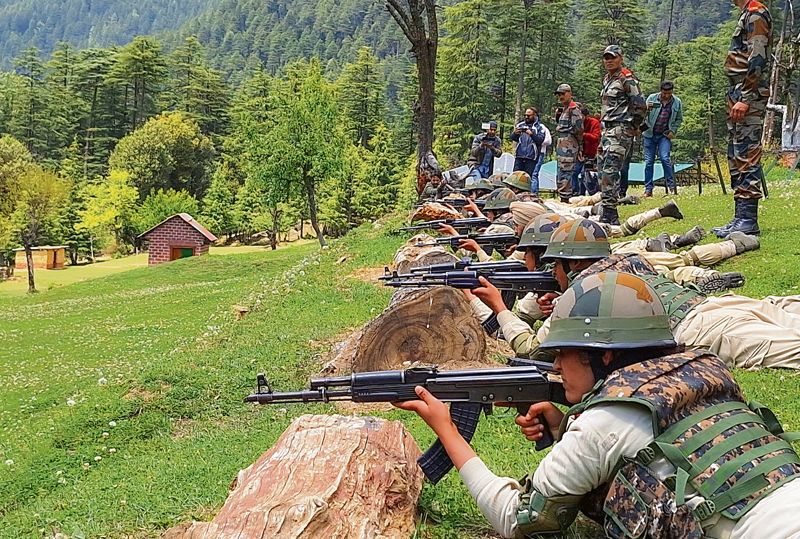The absence of an NSS is believed to be impacting the reorganisation of the country’s military into integrated theatre commands.


THE ongoing General Election has further delayed the long-deferred National Security Strategy (NSS), despite the plethora of high-powered consultative and advisory bodies and think tanks in India’s strategic and military planning realms.
For the defence and security establishment that continually tom-toms its achievements, the lack of an NSS — despite three attempts to produce one in recent years — is disquieting. It is especially troubling as this hiatus persists at a juncture when India confronts threats from nuclear neighbours China and Pakistan and faces technological challenges on the 21st-century battlefield frequently enumerated by the country’s military
The absence of an NSS, from which would also flow the long-delayed and equally vital National Defence Strategy, is believed to be impacting the reorganisation of the military into tri-service integrated theatre commands (ITCs) by harnessing their combined financial, materiel and overall operational capabilities. The architecture of the ITCs was to be forwarded to the government for approval by 2022 by the Chief of Defence Staff (CDS) before operationalising them the following year, but it remains a work in progress.
Media reports in late 2023 had indicated that the National Security Council Secretariat was being tasked with drawing up an NSS with inputs from ministries and assorted departments and forwarding it to the Cabinet Committee on Security headed by PM Narendra Modi for eventual sanction. But no deadline was seemingly determined for such a document, the responsibility for which will now be that of the government which will assume office after the election
But these recurrent rain checks in framing the critical national security architecture were in inverse proportion to the cluster of recommendatory organisations established over decades to devise a robust NSS. Topping this list is the high-rolling, but seemingly dormant, Defence Planning Committee (DPC) created in April 2018 as an ‘overarching’ body to manage India’s defence and security strategy, prepare military capability plans, fast-track materiel acquisitions and augment military diplomacy.
In tandem is the attendant Strategic Policy Group (SPG), revamped some six months later the same year as the first level of the three-tiered National Security Council. The group’s founding responsibility was to foster inter-ministerial coordination and integration of relevant inputs for formulating national security policies like the NSS and related policies and procedures.
Both organisations are headed by National Security Adviser (NSA) Ajit Doval, and their membership was more or less analogous, comprising the three service chiefs and the defence and foreign secretaries. DPC members also include the federal revenue secretary and Chiefs of Staff Committee Chairman — a responsibility that transferred itself to the CDS in December 2019. The Integrated Defence Staff, also headed by the CDS, was designated the secretariat of the DPC, which encompassed four sub-committees to execute its myriad responsibilities.
SPG membership was larger and included heads of the domestic and overseas intelligence-gathering agencies, the cabinet secretary and the secretaries of home, finance, defence production, revenue, atomic energy and space. The scientific adviser to the defence minister and the NITI Aayog vice-chairman, too, were members of the SPG, which was earlier chaired by the cabinet secretary. But after its refurbishment and expansion, the secretary now reports to the NSA.
In short, both the DPC and the SPG were more than qualified to construct an NSS and the attendant national defence strategy. But senior service veterans and security officials concurred that both these organisations had little or no output to show for themselves over the past eight years, with little of policy import forthcoming from either. Their meetings, too, had been infrequent.
Furthermore, these two bodies are supplemented by a host of think tanks backed by either the Ministry of Defence or hand-held by the individual services. These include the Manohar Parrikar Institute for Defence Studies and Analyses in Delhi, the country’s foremost think tank whose founding charter encompasses advanced research in defence, strategic and security issues and other related matters.
Also, there are three service-sponsored think tanks, the Centre for Land Warfare Studies, the National Maritime Foundation and the Centre for Air Power Studies, all operating out of Delhi. Complementing them is the high-maintenance — but low-performance — Centre for Joint Warfare Studies created in 2007 in Delhi to “rise above sectoral and departmental legacies and to examine joint warfare and synergy issues in their entirety” to provide inputs for an NSS.
However, these bodies that, from time to time, are involved in organising seminars and discussions on national security and India’s exalted but elusive role as a major player in global strategic matters, remain mum publicly on anything to do with an NSS, as was flagged by former Army Chief Gen MM Naravane in late 2022.
At a lecture in New Delhi, Gen Naravane recommended the establishment of a higher defence organisation (HDO) with representation from all ministries for a comprehensive approach to theaterisation, which would serve as the ‘interface’ between the government and the ITC commanders on the ground.
“Once these two pillars — NSS and HDO — are in place, we can start thinking about theatre commands,” said the former Army Chief, who retired in April 2022, adding that all talk of theaterisation was simply putting the cart before the horse. But once framed, the NSS, he stated, would make it clear whether the military’s role was just to defend the country’s land borders and territorial waters or if it extended to the wider primary strategic arc stretching from the Persian Gulf to the Malacca Strait. Hopefully, the proposed HDO will not end up being another non-performing asset.
